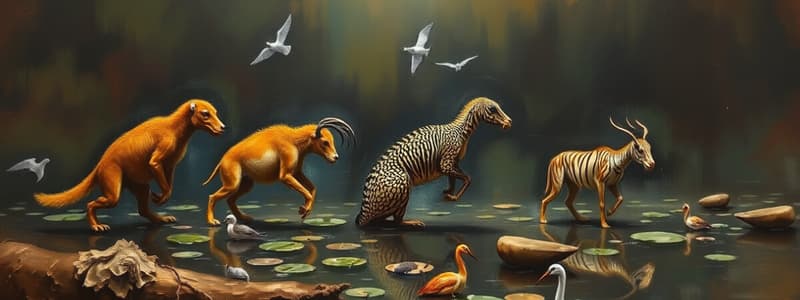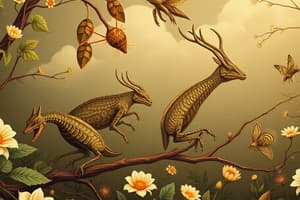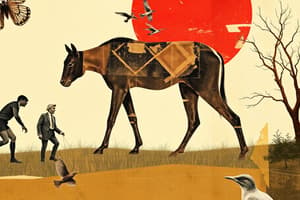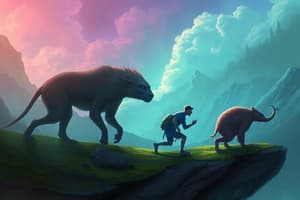Podcast
Questions and Answers
What is the primary mechanism of evolution described that allows individuals with advantageous traits to survive and reproduce more effectively?
What is the primary mechanism of evolution described that allows individuals with advantageous traits to survive and reproduce more effectively?
- Gene flow
- Genetic drift
- Natural selection (correct)
- Mutation
Which concept explains the emergence of new species due to populations becoming isolated with distinct changes?
Which concept explains the emergence of new species due to populations becoming isolated with distinct changes?
- Genetic variation
- Adaptation
- Speciation (correct)
- Microevolution
Which of the following provides evidence for evolution by showing differences and similarities among organisms?
Which of the following provides evidence for evolution by showing differences and similarities among organisms?
- Biogeography
- Comparative anatomy (correct)
- Fossil record
- Molecular biology
How can genetic variation within a species occur?
How can genetic variation within a species occur?
What did the modern synthesis in evolutionary biology integrate?
What did the modern synthesis in evolutionary biology integrate?
According to misconceptions about evolution, which statement is false?
According to misconceptions about evolution, which statement is false?
What aspect of evolution relates specifically to the processes that lead to changes within a population over time?
What aspect of evolution relates specifically to the processes that lead to changes within a population over time?
Which factor does NOT typically influence the adaptations of organisms?
Which factor does NOT typically influence the adaptations of organisms?
What is one of the main reasons for the importance of understanding evolution?
What is one of the main reasons for the importance of understanding evolution?
How did the definition of science change in the 19th century?
How did the definition of science change in the 19th century?
According to Karl Popper, what is a key characteristic of scientific hypotheses?
According to Karl Popper, what is a key characteristic of scientific hypotheses?
What distinguishes science from religion according to the presented concepts?
What distinguishes science from religion according to the presented concepts?
What does the doctrine of creation in Western culture imply about the nature of God?
What does the doctrine of creation in Western culture imply about the nature of God?
Which of the following hominin species is noted for having lived approximately 4.4 million years ago?
Which of the following hominin species is noted for having lived approximately 4.4 million years ago?
Which of the following statements is NOT true regarding God's role in creation according to the complementary perspectives?
Which of the following statements is NOT true regarding God's role in creation according to the complementary perspectives?
What does Georges Lemaitre's theory support regarding the concept of creation?
What does Georges Lemaitre's theory support regarding the concept of creation?
Flashcards are hidden until you start studying
Study Notes
Evolution and Its Concepts
- Evolution explores diversity and complexity of life, focusing on origins and adaptations.
- Traits of species influenced by environmental factors, encouraging changes over time through genetic variations.
- Evolution leads to new species development, adaptation, and a wide diversity of life forms.
- There is a link between form and function, impacting organism performance and overall fitness.
Key Figures in Evolutionary Biology
- Theodosius Dobzhansky: Stated that understanding evolution is essential for biology.
- Charles Darwin and Alfred Russel Wallace: Developed the theory of natural selection, outlined in "On the Origin of Species."
- Gregor Mendel: Pioneered genetic research, focusing on inheritance patterns.
- Modern synthesis integrates natural selection with genetics, addressing macroevolution and microevolution concepts.
Fundamental Concepts of Evolution
- Natural Selection: Survival of individuals with advantageous traits that are passed to future generations.
- Genetic Variation: Arises from mutations, gene flow, and sexual reproduction, creating diverse genetic codes within species.
- Adaptation: Traits enhanced through natural selection that improve survival and reproductive success.
- Speciation: New species arise when populations become isolated and undergo different evolutionary changes.
Evidence Supporting Evolution
- Fossil Record: Provides a historical timeline, illustrating species changes and divergence.
- Comparative Anatomy: Highlights similarities and differences among organisms, suggesting common ancestry.
- Genetics and Molecular Biology: Analyzes DNA sequences to uncover genetic similarities and discrepancies.
- Biogeography: Examines the geographic distribution of species for insights into evolutionary history.
Common Misconceptions About Evolution
- Evolution is often mistakenly viewed as merely a theory, despite significant scientific backing.
- Humans did not evolve directly from monkeys; rather, both share a common primate ancestor.
- Evolution occurs at the population level over many generations, not to individuals.
Significance of Evolution
- Understanding evolution is crucial for appreciating the diversity and dynamics of life on Earth.
- Insights into species adaptation enhance conservation efforts.
- Evolutionary understanding supports advancements in medical research.
Science and Religion Perspectives
- Pre-19th century, science was termed natural or experimental philosophy; became recognized in the 19th century.
- William Whewell popularized the term 'scientist.'
- Karl Popper emphasized that scientific hypotheses must be falsifiable.
Science vs Religion
- Science explains 'how' through empirical methods and observation, without invoking supernatural elements.
- Religion addresses 'why,' focusing on meaning, morality, and ethical guidance.
Contemporary Science and Religion Connections
- Divine action and creation relate to the idea of God creating the world ex nihilo, highlighting the distinction between creator and creature.
- Central questions arise about compatibility between divine creation and scientific explanations.
- Georges Lemaitre proposed the Big Bang theory aligns with the concept of creation from nothing.
Human Origins Through Genetics and Fossils
- Fossil evidence includes notable species like Ardipithecus ramidus (4.4 million years ago) and Australopithecus afarensis (3.5 million years ago).
- Sima de los Huesos relates to early Neanderthal ancestors; Homo neanderthalensis and Homo floresiensis are examples of human diversity.
- The Denisovans, existing around 40,000 years ago, and Homo sapiens, emerging approximately 200,000 years ago, exemplify human evolution.
- Deane-Drummon posits that human morality has evolved alongside social behaviors observed in other animal species.
Studying That Suits You
Use AI to generate personalized quizzes and flashcards to suit your learning preferences.




